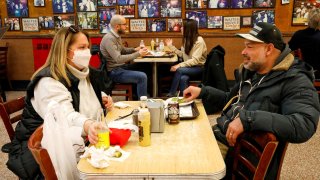
- Reopening indoor dining is "an extraordinarily reckless and premature decision" as new, more transmissible variants of the coronavirus spread in the U.S., virologist Angela Rasmussen told CNBC Friday.
- Indoor dining resumed at a limited capacity in New York and Portland, Oregon, on Friday.
- New, more contagious coronavirus strains originating in the U.K., South Africa and Brazil have been spreading in the U.S.
- Indoor dining increases an individual's risk of coronavirus infection, according to CDC guidelines.
Reopening indoor dining is "an extraordinarily reckless and premature decision" as new, more infectious variants of the coronavirus spread in the U.S., virologist Angela Rasmussen told CNBC Friday.
Indoor dining resumed at a limited capacity in New York and Portland, Oregon, on Friday.
"While I appreciate the economic importance of opening businesses back up and while cases are on the decline, we have new variants that are circulating that are more transmissible," Rasmussen said on CNBC's "The News with Shepard Smith."
Rasmussen, a virologist at Georgetown University's Center for Global Health Science and Security, said the United Kingdom relaxed Covid restrictions early last December. Then, cases surged after a new, more transmissible coronavirus strain was identified.
New, more contagious coronavirus strains originating in the U.K., South Africa and Brazil have been spreading in the U.S.
Money Report
The strain first identified in the U.K. is doubling its reach in the U.S. approximately every 10 days, according to a study published by researchers on Sunday.
"We don't need to create new opportunities for the virus to spread among strangers who are not in each other's household groups," Rasmussen said.
Indoor dining increases an individual's risk of coronavirus infection, according to Center for Disease Control and Prevention guidelines. Ventilation flow inside restaurants can cause aerosols to spread at distances greater than six feet, a study published in November found.
"We need to hang in there a little bit longer with the non-pharmaceutical interventions that are meant to reduce exposure risk, such as masking and distancing, until we can get more people vaccinated," Rasmussen said.






